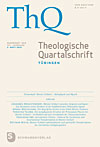archivierte
Ausgabe 2/2021 |


 |
      |
 |
|
|
|
|
 |
|
| Leseprobe 3 |
DOI: 10.14623/thq.2021.2.202–217 |
|
| Yoshihiko Abe |
| Incorporatur Christo |
| Unio as the Eucharistic and Incarnational Transformation in Meister Eckhart |
 |
Zusammenfassung
Bei einem Vergleich von Meister Eckhart mit dem von ihm am häufigsten zitierten Autor, Augustinus, geht es um die Bedeutung der Inkarnation und besonders des eucharistischen Sakramentes für die Verwandlung des menschlichen Ich in den ewigen Sohn Gottes. Durch eine Gegenüberstellung von Augustins „Confessiones“ mit Eckharts frühen „Reden der Unterweisung“ sowie seiner Osterpredigt von 1294 wird deutlich, wie Eckhart das von Augustinus vorgegebene Motiv der Transformation des Menschen durch das Essen der göttlichen Speise aufnimmt und es zugleich zuspitzt zu der Vorstellung, dass „Ich“ und „Du“ bzw. göttliches und menschliches Ich gegeneinander ausgetauscht und durcheinander ersetzt werden.
Abstract
In comparing Meister Eckhart with the author that he cites most often – Augustine, the focus is on the significance of the Incarnation and especially the eucharistic sacrament for the transformation of the human self into the eternal Son of God. By contrasting Augustine’s Confessions with Eckhart’s early Talks of Instruction as well as his Easter sermon of 1294, it becomes clear how Eckhart takes up Augustine’s motif of the transformation of the human person through eating of divine food and at the same time sharpens it to the idea that “I“ and “Thou“ or divine and human are exchanged and replaced by each other.
Schlüsselwörter/Keywords
Meister Eckhart; Augustinus; Inkarnation; Eucharistie; „Confessiones“; „Reden der Unterweisung“; Osterpredigt von 1294
Meister Eckhart; Augustine; Incarnation; Eucharist; Confessions; Talks of Instruction; Easter Sermon of 1294
Introduction
In Book VII of the Confessions, Augustine states that he read“books of the Neoplatonists” and, in these, found the same idea of the Word as in the beginning of the Gospel of John. Augustine says that through these Neoplatonic writings, he experienced the ascent of the soul through the variable created world to the immutable heavenly world (Conf., VII, 20, 26). Could the Neoplatonic Geistmetaphysik have enabled Augustine to experience such light? It seems so. Augustine writes:
“All this (sc. Books of the Neoplatonists) warned me to come back to myself. I entered deep within myself under your guidance, for you became my helper. I entered and saw, as it were with the eye of my soul, above that same eye of my soul, above my mind, the unchangeable light.”
In fact, the experience of that light may be compared to noetic contemplation, in which the eye of the soul is turned to the supreme good which sheds light on all things, as we find in Plato’s Politeia (540a). For Augustine, however, this experience of light was disappointing. As he formulates it:
“When I first recognized you, you lifted me up, to let me see that there was something I must see, but I was not yet capable of seeing it. Your beams of light reflected back the weakness of my sight, so brightly did they shine upon me, and I trembled with love and awe. Then I discovered that I was far away from you, in a place of unlikeness […].”
Augustine says, “I discovered that I was far away from you, in a place of unlikeness [inueni longe me esse a te in regione dissimilitudinis].” He found himself “in a place of unlikeness [in regione dissimilitudinis]” because of the “beams of light.” This illumination was far beyond the weak receptivity of his eyesight. Why was Augustine prevented from seeing this light? Looking back on his failed experience, Augustine recognizes the arrangement of God, who guided him secretly to a more desirable state. He writes:
“At first you wanted to show me how you resist the proud but give grace to the humble, and how by your immense mercy the way of humility [via humilitatis] was made apparent to mortals, because your Word was made flesh and dwelt among mortals. So by means of a certain person who was puffed up with monumental conceit you acquired for me some books of the Neoplatonists translated from Greek into Latin.”
The Neoplatonic writings were indeed helpful in distancing Augustine from Manichaeism and leading him into the realm of wisdom and light. In so doing, these brought about the first signs of his essential conversion to Christianity. However, there is also a new problem to be overcome. He refers to his “pride [superbus]” “swelling [tumor]” inside him, which could be overcome through “the way of humility [via humilitatis]” realized by the Word made flesh as shown above. It was a painful path for Augustine, but it was also a path of healing.
“Thanks to the unseen touch of your hand doing its healing work, my swelling began to go down, while my mental perception, formerly agitated and obscured, was getting better day by day thanks to the effective ointment of wholesome afflictions.”
Augustine’s experience of light seems to highlight not only the disconnection between Neoplatonism and Christianity but also his pride as the cause for the eclipse of the unchangeable light. It involves the question of the corporality of Christ (Corpus Christi). It is also related to the problem of the mystery (sacramentum), which is the basis of Christian mystical thought. In this paper, I shall examine the issue of the incarnate corporality of Christ, which is thematized with the vision of light in Augustine’s Confessions, Book VII, and proceed to the incarnate and eucharistic unity with God according to Meister Eckhart in this context. [...]
Lesen Sie den kompletten Artikel in der Printausgabe.
|
|
|
|
|
|
|
Anzeigen
|
Mit Anzeigen und Inseraten erreichen Sie Ihre Zielgruppe. Anzeige aufgeben
|
 |
|
Unsere Dienstleistung für Verlage, die Ihr Abogeschäft in gute Hände geben wollen.
|

mehr
Informationen
|
 |
|
| Bücher & mehr |

|
|

